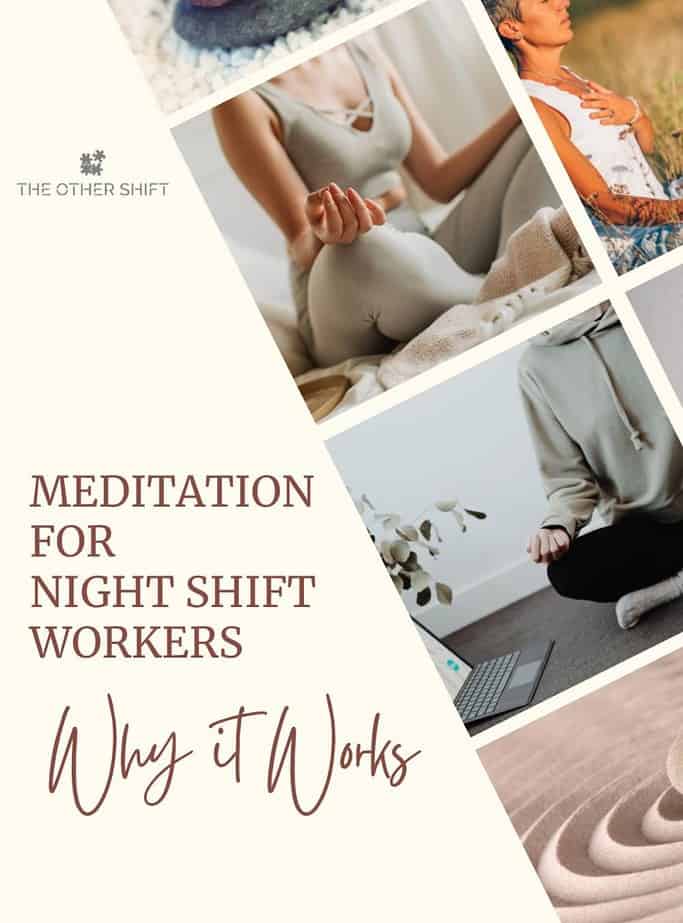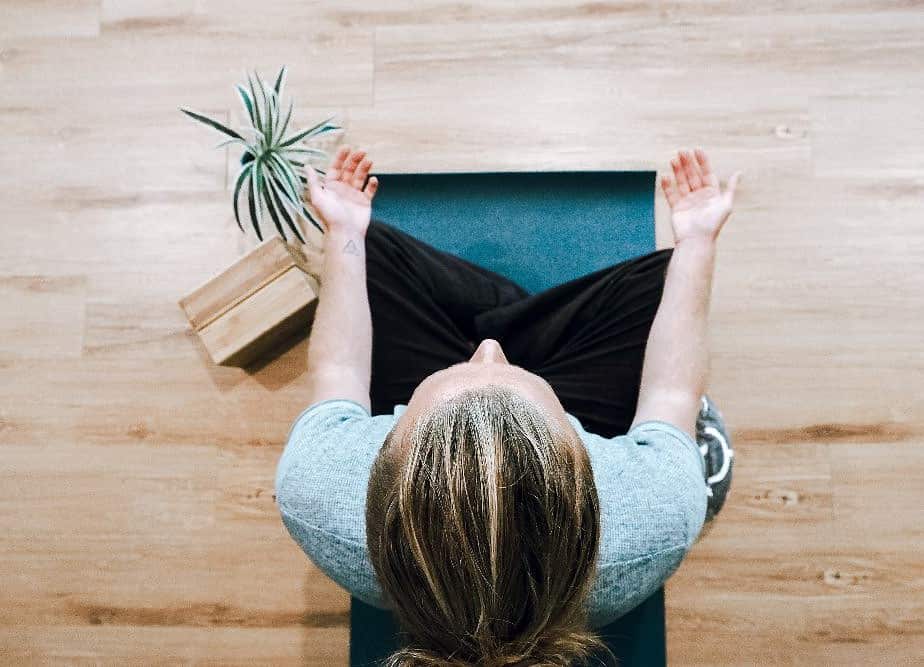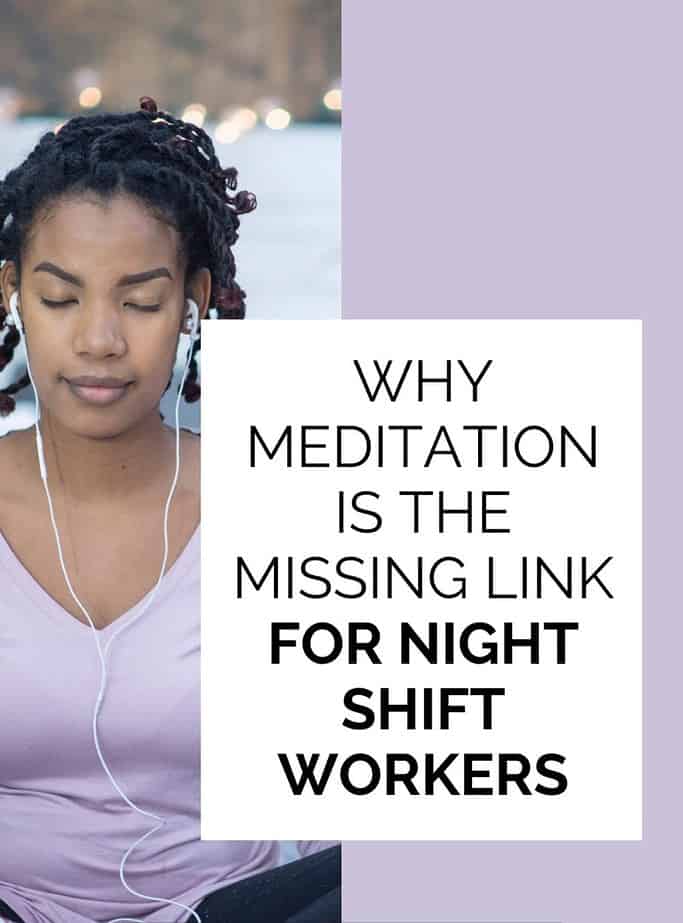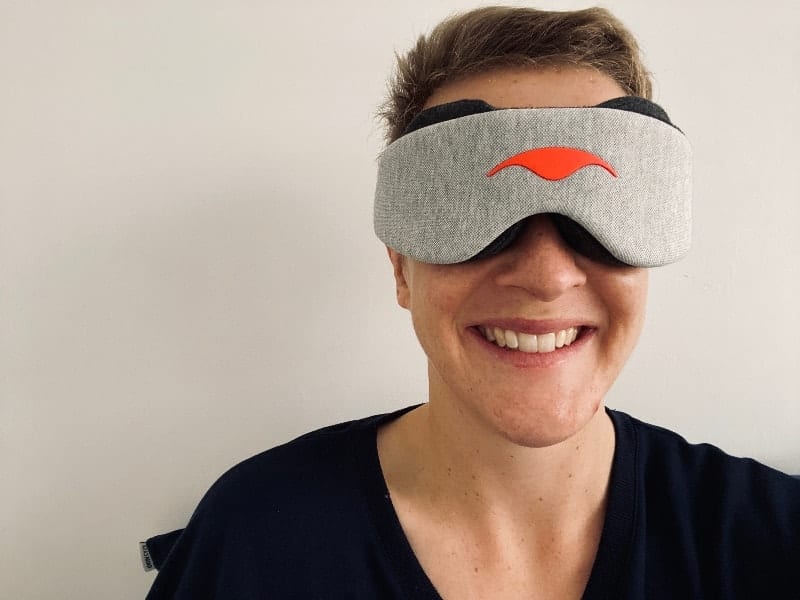Disclosure: This page may contain affiliate links, meaning we receive a commission if you decide to make a purchase through our links, but this is at no additional cost to you. Please read our disclosure and privacy statement for more info.
Historians believe the practice of meditation dates back to the time when Taoism and Buddism developed in 500 B.C. It began its journey in the Western culture during the 1700s when texts of Eastern philosophy were translated into European languages. Now, science has proven just how beneficial this ancient tool is for your mind, body, and spirit – but can it aid in making those who work night shift live a less stressful life?
Meditation for night shift workers is a brain training tool that improves your ability to pay attention, teaches you how to focus and heightens your awareness. Most importantly, meditation assists you with managing your body’s level of the stress hormone, cortisol.
Research has uncovered the mind-body connection that gives meditation its powerful healing properties. When used correctly, meditation can open the door to self-awareness and guide you towards being a better you. Continue reading to find out why this 10-15 minute process can be so effective for those working against their circadian rhythm.
What Meditation Does and Why It’s So Effective
Meditation has a positive impact on several systems in the brain that are responsible for vital functions of the body. It influences the autonomic nervous system which is responsible for maintaining blood pressure and digestion. Using meditation can help you to improve your heart health, reduce pain, and potentially eradicate digestive issues such as irritable bowel syndrome.
Meditation also shapes the response of the sympathetic nervous system, your body’s fight or flight reaction to stress. This system of the brain controls your heart rate and breathing. It also influences your blood pressure. Learning how to meditate will guide you toward an optimally balanced state of arousal by reducing feelings of being overwhelmed or overstimulated.
Using meditation slows down your heart rate and respiration to healthier levels making it easier to think clearly. It can improve your brain’s functioning and reduce the amount of cortisol in your body. Best of all, meditation boosts your immunity, memory, and emotional well-being.
The benefits of meditation go beyond your physiological health as well. According to Burke Lennihan of Harvard University Center of Wellness,
Meditation benefits your spirituality, daily meditation has shown signs of improved creativity, intuition, and self-awareness.
Combined with the proven health benefits of meditation, it becomes clear to see why this ancient tool has lasted so long. As science continues to explore the benefits of meditation, more people are finding it to be just what they need to improve their health and maintain control of their emotions – areas that are placed under added stress when working night shift.

The Science Behind Meditation
Continued research into how meditation works led to the discovery of the importance of alpha brainwaves. These alpha waves are most active right after you’ve awakened for the day. Your body and mind are in the most relaxed state while awake. You have yet to be bogged down with thoughts of yesterday’s problems or today’s agenda.
Meditation increases alpha brain wave activity, bringing you back to this deeply relaxed state of mind and body. Alpha waves induced by meditation aid in reducing the physical and mental feelings associated with stress. They also deepen your feelings of relaxation and boost creativity.
Some types of meditation positively impact your brain’s hippocampus where learning, memories, and emotions all come together. When you hear a song and it reminds you of a time from your past that’s your hippocampus at work. It’s also responsible for those times when the sweet scent of apple pie takes you down memory lane.
The performance of your brain’s hippocampus can be improved through the daily practice of meditation. This can be especially helpful if you’re struggling with memory issues or if you are trying to learn something new. In addition, a well-maintained hippocampus will make it easier for you to manage your feelings and emotions.
Meditation has also been found to build up the amount of grey matter in your brain. Gray matter is what regulates your sensory perceptions of sight, sound, taste, touch, and smell. It also has an important role in directing muscle control. With proper training, structural modifications can occur in your brain through the use of certain types of meditation.
Another science-backed benefit of using a consistent meditation program comes from the stress-reducing factor of meditating. Keeping your levels of stress in check will prevent cytokine inflammation that occurs from a build-up of cortisol. Too much cortisol in your body will:
- disrupt your ability to sleep
- raise feelings of anxiety
- increase your risk of developing depression
- escalate your blood pressure
Meditation as a stress management tool has been found to effectively treat a number of stress-related conditions. These include irritable bowel syndrome, Post-Traumatic Stress Disorder, and fibromyalgia. When used to destress, meditation will begin to assist you with managing feelings of anxiety which leads to an improved self-image.
If you need a quick, yet very effective meditative technique – watch this quick video.
Best Types of Meditation for Night Shift Workers
Just like a gym has hundreds of different exercises for sculpting your body, meditation has dozens upon dozens of techniques for strengthening your mind. Finding the right types of meditation for you will require a bit of research and knowledge of what you want to accomplish. To get the most out of your meditating, it’s important to use the technique designed to meet your specific goal.
Let’s take a look at what these popular types of meditation can do to enhance your daily routine.
Mindfulness
- Great for improving your focus and concentration skills
- Emphasis is on objective observation of your sensations, thoughts, and feelings
- Trains the mind to stay in the present moment instead of past or future events
Spiritual or Heart-Centered
- Designed to connect with a higher power to become centered
- Builds your awareness of self and the world around you
- Opens the mind to receive the creative energy
Movement
- Creates a deeper mind-body synergy
- Combines focus of the mind with the muscle control of the body
- Examples include Tai-Chi, Yoga, and walking
Mantra
- Capitalizes on the effects of repetition through chanting a sound or phrase
- Ideal for clearing the mind of distractions
- Perfect for self-improvement goals and positive self-talk
Progressive
- Also called the body scan technique
- The focus is on relaxing the tension in the body from head to toe
- Can be a guided meditation or develop your own style
Transcendental
- Perfect for regaining a calming peace after a stressful event
- Requires proper training and uses mantra technique
- The goal is to quiet the mind and clear away negative energy
Visualization
- Restoration of calm feelings through the use of an image or object
- Useful when trying to reach a specific goal like weight loss or a career move
- Enhances your focus and can help you build a positive self-image
Related post: The Advanced Guide to Self-Care and Night Shift

How Much Meditation is Enough When You Work Nights
The right amount of meditation per session will vary from person to person. It will also depend on the goal of the particular technique you’re using to meditate. The key is to figure out what works best for you.
Most meditation experts recommend starting with a brief session of 5-10 minutes.
Then you can increase the length of time to fit the various needs your meditation sessions meet. The quality of the meditation session is far more important than the number of minutes you spend to achieve results.
Some people only need 10-15 minutes of valuable meditation to get results. Others may require a longer session to achieve the same level of benefits. In either case, meditating every day will show noticeable results in a few weeks.
The key to meditation is consistently practicing it at the same time every day. How much time you spend meditating has far less impact than the consistency of the sessions. As few as five minutes per session done routinely can be enough while some people enjoy a longer time spent in tranquility.
Here is an excellent example of a 5-minute meditation. Take a look
Best Time to Meditate for Night Shift Workers
Masters in the field of meditation speak of a prime time for meditating known as the ambrosial hours. This two-and-a-half-hour window of time takes place just before sunrise. It is said that at this time, a unique combination of stillness and supportive energy exists at a moment when the sun’s angle to the Earth is 60 degrees.
For most night shift workers, you are most likely still on the job at ambrosial hours. So the best time for you to meditate will depend on your schedule and the purpose of your meditation.
- Are you clearing your mind and preparing to go to work?
- Have you just finished work and are ready to wind down?
- Do you need to reduce stress before giving a presentation or talking to the boss?
- Did you experience a traumatic event but still need to continue through?
Practitioners of meditation recommend a meditation session first thing after waking up. Your alpha waves are already at maximum performance and your body is most relaxed before getting out of bed. Also, scheduling a meditation session at the start of your day reduces the chance of forgetting to do it later.
Other advantages to starting your day with meditation include:
- you’re at your highest level of energy which provides motivation to get it done
- your mind is free of distractions making it easier to stay focused
- facing your day with minimal feelings of stress and anxiety
- prolonged effects from the meditation keep you focused and performing at your best for longer durations than without
- sustained energy levels that help stave off boredom
Meditation after exercise is another time where you can take advantage of the body’s low-stress levels. Taking a few minutes to sit absolutely still will be easier to do after a vigorous workout. Plus, this time slot will give you an opportunity to calm your heart rate and return to a relaxed respiration rate.
At work, taking the opportunity to meditate during your breaks can boost your mood and keep your mind sharp and focused. Finding the time that fits both your schedule and your needs can be tricky but never impossible. Here is a great aid to help you find stillness.
Meditation after getting home from work has its own list of benefits. Setting aside time after a busy shift can help set the mood for a calm and relaxing sleep. It gets your mind and body prepared for deep relaxation and healing, which can be difficult for night workers who sleep during the day.
Pre-sleep meditation has the potential to improve your:
- health and longevity
- focus and attention span
- overall emotional well-being
Struggling to sleep on the night shift? This video will help.
The important aspect of choosing what time of day to meditate is finding a moment when you have plenty of time to enjoy your meditation session. Your goal is to benefit from these sessions not just check off another item from your daily to-do list.
Rushing through the meditation because of a hectic schedule is counterproductive resulting in more stress.
It’s not uncommon for your mind to be running wild with random thoughts as you’re trying to go to sleep. Meditating a few hours before going to bed can help mute the stream of consciousness bombarding your tired mind. It can be the perfect time for using mantra techniques or other self-image improvement methods.
Creating a meditation habit will come from keeping a consistent schedule of daily sessions. It takes time for new habits to stick so by establishing a set time each day for meditation, it will become easier to do. The more consistent your meditation schedule is, the sooner you will begin to see lasting results. I’m reading this great book to create new habits, highly recommend it!)

Tips for Getting Started
- Create a quiet meditation space using candles or aroma therapy tools to enhance your sensory experience
- Meditate in a comfortable spot where you are able to sit still for a long period of time making sure to keep your back straight. I also find laying down works perfectly well too.
- Commit to a specific time of day and meditate at that time every day to ensure the best results
- Breath in slow, filling your lungs and abdominal cavity to capacity, before gently exhaling as you remain focused on releasing the stress, anxieties, and negative thoughts
- Your meditation goal is to affix to the here and now by focusing on your physical existence at this specific moment in time through acknowledgment of your senses, thoughts, and emotions
- Envision meditation as a mental realignment to improve attention, focus, and aid in the management of your emotions
Don’t forget about meditation podcasts too. These are brilliant at keeping me focused.
Potential Risks Involved with Meditation
- Expecting too much too quickly
- Remember that habits don’t happen overnight and it will take several weeks of consistent daily meditation before you begin to see a noticeable difference in your life.
- Meditation is not the cure-all for every problem in life. Tools are designed to do a specific job and meditation is no exception. It can fix certain problems and improve situations but it won’t repair everything all on its own.
- Remember that habits don’t happen overnight and it will take several weeks of consistent daily meditation before you begin to see a noticeable difference in your life.
- It may lead to thoughts and feelings that are difficult to experience and hard to overcome
- In the process of clearing your mind, there will be moments where painful memories or dark ideas may pop into your thoughts. Learning how to safely acknowledge those thoughts and be able to let go of them without acting on them may require professional assistance.
- You may be at risk of increased feelings of depression and anxiety when you don’t know the proper methods of meditation
- In the process of clearing your mind, there will be moments where painful memories or dark ideas may pop into your thoughts. Learning how to safely acknowledge those thoughts and be able to let go of them without acting on them may require professional assistance.
- Studies have shown that meditation has the potential to cause an increase in psychotic episodes among people with schizophrenia

Four Popular Meditation Apps for Your iPhone or Android
Calm
- An eclectic set of meditation tools for relaxation and sleep
- New material every day
- Range of session lengths from 3 minutes up to 25 minutes
- Sleep stories designed to lull you into slumber like the bedtime stories of your childhood used to do
- Exclusive music library filled with familiar artists chosen to set your mood right or peaceful soundscapes to inspire change
- Classes taught by meditation masters to get you started on the right path
HeadSpace
- Promotes mindfulness and managing stress
- New meditation topics each day
- Guided meditation as well as exercises in mindfulness
- Meditations specifically geared toward inducing sleep
- A multitude of meditation types to meet different needs
- Fitness, focus, and boosting creativity are a few of the benefits
Balance: Meditation and Sleep
- Personalized meditation program that won Best App of 2021
- Provides a virtual coach to assess your needs, goals, and preferences
- As you progress through the program it will adapt to your changes based on your continued input each day
- Learning modules are set up on a 10-day schedule to thoroughly cover important topics on technique and fundamentals
- Bite-size meditations are available for easy use on the go wherever you need them
- Relaxation exercises designed for bedtime will get your mind and body ready to rejuvenate the right way
Insight Timer
- Won App of the Year with both Time Magazine and Women’s Health (source)
- Guided meditations, music for sleeping, and talks by renowned experts in numerous health and wellness fields from top universities
- Hundreds of new meditations and tracks are added daily
- Set up scheduled times to help to establish a consistent meditation habit
- Dozens of meditation techniques are available all the time
- A large variety of educational topics related to meditation including help with sleep disorders and addiction problems
Related post: Best Shift Work Apps to Make Your Life Easier
These are some of the tools which help us wind down and take a second to ourselves.


Craving more take a look at this one How Do I Relax Before A Night Shift? Find Your Zen Now
Cheers,

Disclosure: This page may contain affiliate links, meaning we receive a commission if you decide to make a purchase through our links, but this is at no additional cost to you. Please read our disclosure and privacy statement for more info.
Recent Posts
Finished medical school? Ready to begin residency? Sorry to say but the hard part starts now. Work through the day, stay on call at night, and then work through the next day, hoping to get some sleep...
Working the night shift can be hard, and nightshift workers are some of the toughest, most resilient of them all. Long shifts with little sleep before, often equate to unhealthy eating and countless...

